 BEIJING — For generations, the “Eight-Year War of Resistance Against Japanese Aggression” has been ingrained in the minds of Chinese schoolchildren. Revolutionary hymns evoked the bloody years, from 1937 to 1945, of what is known outside China as the Second Sino-Japanese War. Documentaries denounced Japan ’s “eight years of belligerence.”
BEIJING — For generations, the “Eight-Year War of Resistance Against Japanese Aggression” has been ingrained in the minds of Chinese schoolchildren. Revolutionary hymns evoked the bloody years, from 1937 to 1945, of what is known outside China as the Second Sino-Japanese War. Documentaries denounced Japan ’s “eight years of belligerence.”
Now the war is getting a new name, and an extended time frame.
In a move aimed at stirring up nationalism and support for the ruling Communist Party, President Xi Jinping’s government has ordered educators to rewrite textbooks to describe the conflict as the “14-Year War of Resistance Against Japanese Aggression,” lasting from 1931 to 1945, the authorities said in a statement on Wednesday.
Under the decision, the Second Sino-Japanese War will be described as having started in the fall of 1931, when the Imperial Japanese Army invaded Manchuria. Previously, the war’s beginning had been traced to the Marco Polo Bridge incident, a skirmish in 1937 between Japanese forces and Chinese troops along a rail line southwest of Beijing that marked the beginning of full-scale conflict.
The Chinese Ministry of Education said the decision to add six years to the war sought to promote patriotic education and to highlight the Communist Party’s “core role” in resisting Japanese fascism in the prelude to World War II. It also seemed intended to rally support for the party among young people as Mr. Xi vigorously promotes Communist history and thought in schools.
Zhang Lifan, a historian in Beijing, said the decision to revise the length of the war was justified from a historical perspective. But he said it would also have political benefits for the party and would encourage anti-Japanese sentiment.
“Chinese leaders still have a Cold War mentality,” he said. “They’ve tried to conjure up imaginary enemies in the world.”
Mr. Xi has worked in recent years to enhance the image of the Communists and their achievements in World War II, even though many historians believe it was the Chinese Nationalists, not the Communists, who did most of the fighting.
The party had not previously emphasized the fight against the Japanese from 1931 to 1937, when Communist forces were in disarray as they fought a civil war with the Nationalists. During that time, the Nationalists led efforts to resist the Japanese and negotiate truces. It was not until 1937 that the Communists joined forces with the Nationalists to fight an increasingly belligerent Imperial Japanese Army.
Kerry Brown, a professor of Chinese politics at King’s College London, called the textbook revision a “tidying up of history.” He said the revised account exaggerated the Communists’ accomplishments.
“It demonstrates this continuing keenness by the party now to seek sources of legitimacy wherever it can,” he said, “and reveals more insecurity than real strength.”
The change will probably ruffle feathers in Japan, China’s longtime rival, as the countries jockey for influence in Asia and struggle to overcome the legacy of World War II, more than 70 years after the global conflict ended.
Japanese officials did not respond to requests for comment on Wednesday. But Masumi Kawasaki, a Shanghai-based correspondent for Sankei Shimbun, a right-leaning daily, wrote in an article that Mr. Xi’s government was “trying to heighten its anti-Japanese stance through history education.”
Mr. Xi has accused Japan of distorting history , and the Chinese state news media has criticized Tokyo’s efforts to revise textbooks , saying it has played down atrocities by Japanese soldiers.
When Prime Minister Shinzo Abe of Japan visited Pearl Harbor last month, Chinese internet users brimmed with outrage, saying Mr. Abe had not done enough to apologize to China for Japan’s actions during World War II.
In Beijing, many people applauded the government’s decision to revise the textbooks, which are filled with references to wars against “aggression” by foreign forces. The Korean War, for example, is known as the war to resist United States aggression and aid Korea.”
“The Japanese have also altered their textbooks, why can’t we?” said Wang Yalin, 30, a musician. Still, he said, the change would most likely fuel anti-Japanese sentiment in China.
Zhao Feng, 38, a tailor, acknowledged that the relationship between the countries had deteriorated. But he said it was important to note the earlier date of Japan’s invasion of China. “The occupation started much earlier,” he said.
On social media, some were more skeptical of the government’s motives.
“Don’t use history education for political ends,” one person wrote on Weibo, China’s equivalent of Twitter. “The most important thing is to learn the truth.”
© Source: http://www.nytimes.com/2017/01/11/world/asia/china-japan-textbooks-war.html
All rights are reserved and belongs to a source media.
 【ニューヨーク=平野麻理子】トランプ次期米大統領は11日、当選後初めて記者会見を開き「最も多くの雇用を作り出す大統領になる」と抱負を述べた。米国外に工場を作る企業には「高い国境税をかける」とけん制し、製薬業界など産業界に米国で生産するよう呼びかけた。米大統領選へのサイバー攻撃については「ロシアが関与した」と認める一方、「他の国も攻撃した」と指摘した。
【ニューヨーク=平野麻理子】トランプ次期米大統領は11日、当選後初めて記者会見を開き「最も多くの雇用を作り出す大統領になる」と抱負を述べた。米国外に工場を作る企業には「高い国境税をかける」とけん制し、製薬業界など産業界に米国で生産するよう呼びかけた。米大統領選へのサイバー攻撃については「ロシアが関与した」と認める一方、「他の国も攻撃した」と指摘した。 

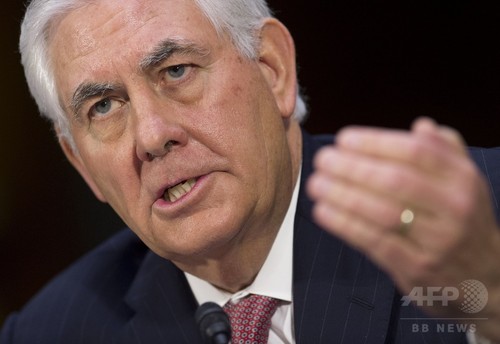 【1月12日 AFP】米上院外交委員会は11日、ドナルド・トランプ( Donald Trump )次期大統領が国務長官への起用を決めた米石油大手エクソンモービル( ExxonMobil )のレックス・ティラーソン( Rex Tillerson )前最高経営責任者(CEO)の人事承認に関する公聴会を開いた。親ロシア派との批判を受けている同氏は、ロシアに対する強硬姿勢を取り、同国は国際的に危険な存在であり米国の友好国にはなり得ないだろうとの見解を示した。
【1月12日 AFP】米上院外交委員会は11日、ドナルド・トランプ( Donald Trump )次期大統領が国務長官への起用を決めた米石油大手エクソンモービル( ExxonMobil )のレックス・ティラーソン( Rex Tillerson )前最高経営責任者(CEO)の人事承認に関する公聴会を開いた。親ロシア派との批判を受けている同氏は、ロシアに対する強硬姿勢を取り、同国は国際的に危険な存在であり米国の友好国にはなり得ないだろうとの見解を示した。 
 (BEIJING) — China said Wednesday it was committed to promoting peace and stability in Asia, even as it sent an aircraft carrier battle group through the Taiwan Strait amid heightened tensions between Beijing and the self-ruled island.
(BEIJING) — China said Wednesday it was committed to promoting peace and stability in Asia, even as it sent an aircraft carrier battle group through the Taiwan Strait amid heightened tensions between Beijing and the self-ruled island. 
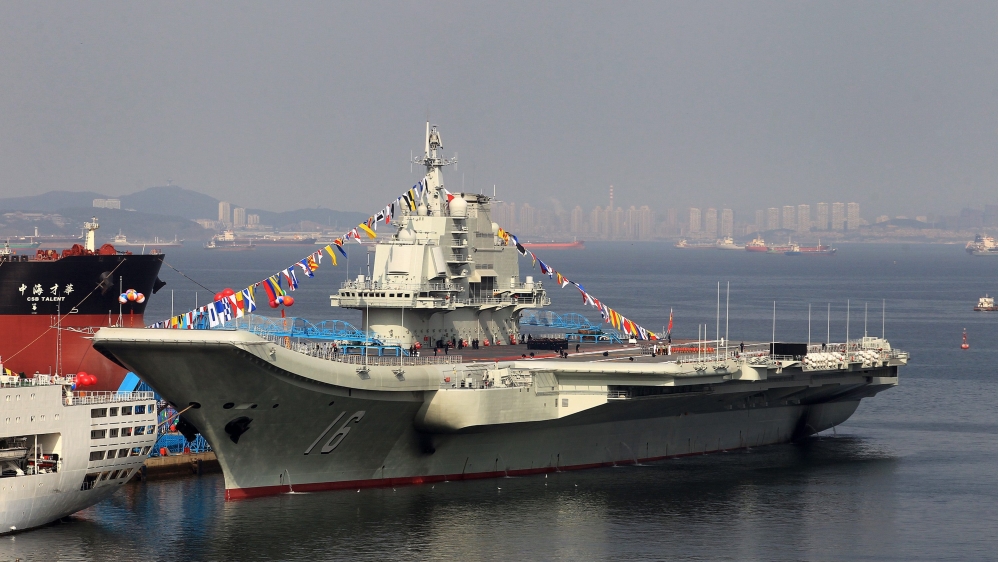 Taiwan has urged its citizens to remain calm after a Chinese aircraft carrier entered the Taiwan Strait in a highly symbolic show of strength.
Taiwan has urged its citizens to remain calm after a Chinese aircraft carrier entered the Taiwan Strait in a highly symbolic show of strength. 
 China’s Soviet-built ‘Liaoning’ aircraft carrier led warships through the Taiwan Strait on Wednesday, while returning from exercises in the South China Sea. Although Taiwan’s Defense Ministry stated that the carrier was not trespassing in the country’s territorial waters, it confirmed that it did enter its air defense identification zone (ADIZ) in the southwest.
China’s Soviet-built ‘Liaoning’ aircraft carrier led warships through the Taiwan Strait on Wednesday, while returning from exercises in the South China Sea. Although Taiwan’s Defense Ministry stated that the carrier was not trespassing in the country’s territorial waters, it confirmed that it did enter its air defense identification zone (ADIZ) in the southwest. 
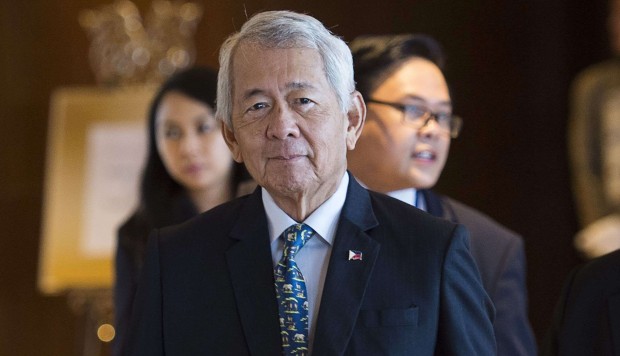 The Philippines won’t raise its recent arbitration victory against Chinese territorial claims in the South China Sea during Asian summit talks that it will host this year, Foreign Secretary Perfecto Yasay Jr. said Wednesday. Yasay said pressing last year’s ruling at the annual meetings of the Association of Southeast Asian Nations “is just simply counter-productive.” The Philippines intends to raise the ruling, which invalidated China’s historic claims under a 1982 U. N. treaty, in bilateral talks with Beijing in the future, Yasay said, stressing that the arbitration decision is final and won’t be changed by discussions at international conferences. “We are not going to raise this issue … because there is really no useful benefit,” Yasay said at a news conference. “This is a matter that we will be raising with China at some future time in bilateral talks and to do and involve others in the discussion of this decision is just simply counter-productive for our purposes.” “Now if any country would like to pursue their respective claims against China with respect to a disputed territory in the South China Sea, they can do so and perhaps use the decision of the arbitral tribunal as a precedent-setting case in pursuing the matter,” he said. The Philippines was previously one of the most vocal critics of China at the annual ASEAN meetings as Beijing asserted its vast territorial claims in the South China Sea. After China took control of disputed Scarborough Shoal in 2012 and blocked Filipinos from the rich fishing area, then President Benigno Aquino III brought his country’s territorial disputes with Beijing to international arbitration. China ignored the Philippine case and refused to recognize the outcome, which was heavily in favor of the Philippines. President Rodrigo Duterte, who succeeded Aquino in June, has taken dramatic steps to mend strained relations with China. He has also taken an antagonistic stance against the administration of outgoing President Barack Obama after the U. S. leader criticized his deadly crackdown on illegal drugs. As host of the ASEAN meetings this year, the Philippines is in a position to influence their focus and the joint communiques issued at the end of the conferences. China, the U. S. and Russia and other Western and Asian nations will join expanded meetings later in the year. Yasay said the Philippines will push for the faster completion of a long-delayed “code of conduct” between China and ASEAN to discourage aggressive actions that could ratchet up tensions in the South China Sea, a busy waterway for world trade. The Philippines wants the framework of the nonaggression pact to be completed within the first half of this year, Yasay said. The prospects for the signing of a legally binding regional code remain unclear. Philippine diplomats have said negotiations over the code have been stalled in the past by China while it covertly turned disputed reefs into artificial islands which can now be used by Beijing to better defend its territorial claims.
The Philippines won’t raise its recent arbitration victory against Chinese territorial claims in the South China Sea during Asian summit talks that it will host this year, Foreign Secretary Perfecto Yasay Jr. said Wednesday. Yasay said pressing last year’s ruling at the annual meetings of the Association of Southeast Asian Nations “is just simply counter-productive.” The Philippines intends to raise the ruling, which invalidated China’s historic claims under a 1982 U. N. treaty, in bilateral talks with Beijing in the future, Yasay said, stressing that the arbitration decision is final and won’t be changed by discussions at international conferences. “We are not going to raise this issue … because there is really no useful benefit,” Yasay said at a news conference. “This is a matter that we will be raising with China at some future time in bilateral talks and to do and involve others in the discussion of this decision is just simply counter-productive for our purposes.” “Now if any country would like to pursue their respective claims against China with respect to a disputed territory in the South China Sea, they can do so and perhaps use the decision of the arbitral tribunal as a precedent-setting case in pursuing the matter,” he said. The Philippines was previously one of the most vocal critics of China at the annual ASEAN meetings as Beijing asserted its vast territorial claims in the South China Sea. After China took control of disputed Scarborough Shoal in 2012 and blocked Filipinos from the rich fishing area, then President Benigno Aquino III brought his country’s territorial disputes with Beijing to international arbitration. China ignored the Philippine case and refused to recognize the outcome, which was heavily in favor of the Philippines. President Rodrigo Duterte, who succeeded Aquino in June, has taken dramatic steps to mend strained relations with China. He has also taken an antagonistic stance against the administration of outgoing President Barack Obama after the U. S. leader criticized his deadly crackdown on illegal drugs. As host of the ASEAN meetings this year, the Philippines is in a position to influence their focus and the joint communiques issued at the end of the conferences. China, the U. S. and Russia and other Western and Asian nations will join expanded meetings later in the year. Yasay said the Philippines will push for the faster completion of a long-delayed “code of conduct” between China and ASEAN to discourage aggressive actions that could ratchet up tensions in the South China Sea, a busy waterway for world trade. The Philippines wants the framework of the nonaggression pact to be completed within the first half of this year, Yasay said. The prospects for the signing of a legally binding regional code remain unclear. Philippine diplomats have said negotiations over the code have been stalled in the past by China while it covertly turned disputed reefs into artificial islands which can now be used by Beijing to better defend its territorial claims.
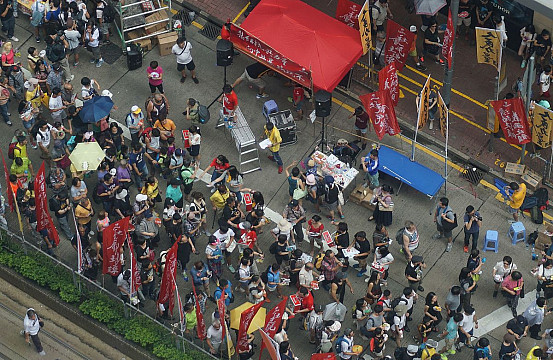 Amnesty International has released its Hong Kong Annual Report reviewing the human rights of Hong Kong over the past year. It states that the city’s human rights situation has rapidly deteriorated in recent times and is at its worst levels since the handover back to Chinese rule in 1997.
Amnesty International has released its Hong Kong Annual Report reviewing the human rights of Hong Kong over the past year. It states that the city’s human rights situation has rapidly deteriorated in recent times and is at its worst levels since the handover back to Chinese rule in 1997. 
 The price of bitcoin fell by around 10 percent after Chinese authorities announced plans to inspect bitcoin enterprises.
The price of bitcoin fell by around 10 percent after Chinese authorities announced plans to inspect bitcoin enterprises. 
 BEIJING — For generations, the “Eight-Year War of Resistance Against Japanese Aggression” has been ingrained in the minds of Chinese schoolchildren. Revolutionary hymns evoked the bloody years, from 1937 to 1945, of what is known outside China as the Second Sino-Japanese War. Documentaries denounced Japan ’s “eight years of belligerence.”
BEIJING — For generations, the “Eight-Year War of Resistance Against Japanese Aggression” has been ingrained in the minds of Chinese schoolchildren. Revolutionary hymns evoked the bloody years, from 1937 to 1945, of what is known outside China as the Second Sino-Japanese War. Documentaries denounced Japan ’s “eight years of belligerence.” 
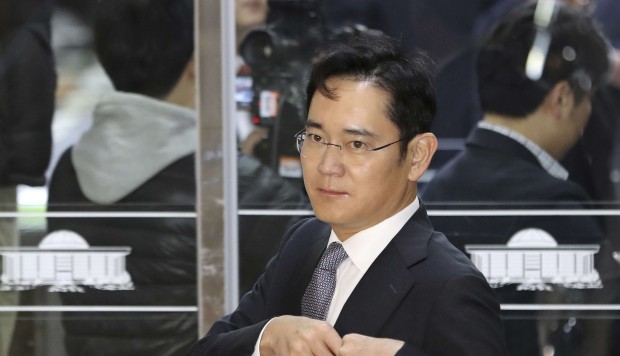 Samsung heir Lee Jae-yong has become a criminal suspect in a widening probe into the corruption and influence-peddling scandal engulfing the impeached , prosecutors said Wednesday. Lee, vice chairman of Samsung Electronics and the son of the Samsung Group chairman Lee Kun-hee, would be quizzed as a “suspect” in connection to bribery, prosecutors said. “We have decided to question Lee tomorrow morning… as a suspect,” Lee Kyu-Chul, spokesman for the team of special prosecutors investigating the scandal, told reporters. The affair centres on , who is accused of using her ties to Park to coerce top firms into “donating” tens of millions of dollars to two non-profit foundations which Choi then used as her personal ATMs. Samsung was the biggest contributor to the foundations. It is also accused of separately giving millions of euros to Choi to bankroll her daughter’s equestrian training in Germany in a bid to curry favour. Prosecutors have for months questioned Lee and other senior Samsung officials. The officials reportedly argued that although they were coerced to offer money, they sought no favours in return and thus the payments were not a bribe. Spokesman Lee said prosecutors “left open the possibility” of formally arresting the Samsung scion later. Prosecutors are investigating whether Samsung bribed Choi in order to win state approval for a controversial merger which it sought in 2015. The merger of two Samsung group units – Cheil Industries and Samsung C&T – was seen as a crucial step towards ensuring a smooth third-generation power transfer to Lee Jae-yong. It was criticised by many, who said it wilfully undervalued Samsung C&T’s stocks. But the National Pension Service (NPS) – a major Samsung shareholder – voted in favour of the deal and it eventually went through. Prosecutors have raided multiple Samsung offices as well as the NPS in connection with the scandal. The fund – the world’s third largest pension fund – is overseen by the welfare ministry. A former welfare minister was arrested last month for allegedly pressuring NPS officials to vote in favour of the Samsung deal. Park, who stands accused of colluding with Choi to extract money from the firms, was impeached by parliament last month but denies any criminal wrongdoing. The Constitutional Court is currently reviewing the validity of her impeachment. Choi is on trial for charges including coercion and abuse of power.
Samsung heir Lee Jae-yong has become a criminal suspect in a widening probe into the corruption and influence-peddling scandal engulfing the impeached , prosecutors said Wednesday. Lee, vice chairman of Samsung Electronics and the son of the Samsung Group chairman Lee Kun-hee, would be quizzed as a “suspect” in connection to bribery, prosecutors said. “We have decided to question Lee tomorrow morning… as a suspect,” Lee Kyu-Chul, spokesman for the team of special prosecutors investigating the scandal, told reporters. The affair centres on , who is accused of using her ties to Park to coerce top firms into “donating” tens of millions of dollars to two non-profit foundations which Choi then used as her personal ATMs. Samsung was the biggest contributor to the foundations. It is also accused of separately giving millions of euros to Choi to bankroll her daughter’s equestrian training in Germany in a bid to curry favour. Prosecutors have for months questioned Lee and other senior Samsung officials. The officials reportedly argued that although they were coerced to offer money, they sought no favours in return and thus the payments were not a bribe. Spokesman Lee said prosecutors “left open the possibility” of formally arresting the Samsung scion later. Prosecutors are investigating whether Samsung bribed Choi in order to win state approval for a controversial merger which it sought in 2015. The merger of two Samsung group units – Cheil Industries and Samsung C&T – was seen as a crucial step towards ensuring a smooth third-generation power transfer to Lee Jae-yong. It was criticised by many, who said it wilfully undervalued Samsung C&T’s stocks. But the National Pension Service (NPS) – a major Samsung shareholder – voted in favour of the deal and it eventually went through. Prosecutors have raided multiple Samsung offices as well as the NPS in connection with the scandal. The fund – the world’s third largest pension fund – is overseen by the welfare ministry. A former welfare minister was arrested last month for allegedly pressuring NPS officials to vote in favour of the Samsung deal. Park, who stands accused of colluding with Choi to extract money from the firms, was impeached by parliament last month but denies any criminal wrongdoing. The Constitutional Court is currently reviewing the validity of her impeachment. Choi is on trial for charges including coercion and abuse of power.

